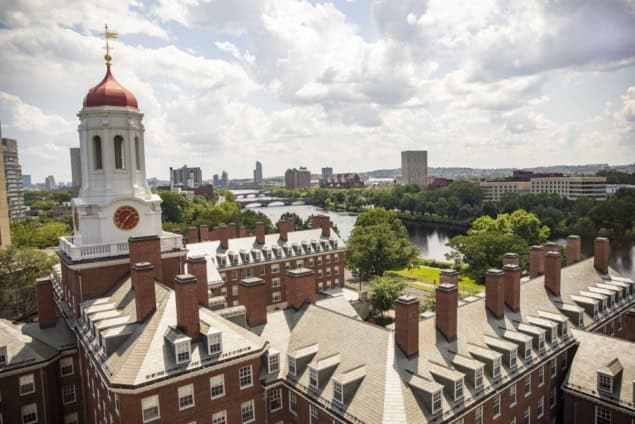
Harvard University is suing the Trump administration over its plan to block up to $9bn of government research grants to the institution. The suit, filed in a federal court on 21 April, claims that the administration’s “attempt to coerce and control” Harvard violates the academic freedom protected by the first amendment of the US constitution.
The action comes in the wake of the US administration claiming that Harvard and other universities have not protected Jewish students during pro-Gaza campus demonstrations. Columbia University has already agreed to change its teaching policies and clamp down on demonstrations in the hope of regaining some $400,000 of government grants.
Harvard president Alan Garber also sought negotiations with the administration on ways that it might satisfy its demands. But a letter sent to Garber dated 11 April, signed by three Trump administration officials, asserted that the university had “failed to live up to both the intellectual and civil rights conditions that justify federal investments”.
The letter demanded that Harvard reform and restructure its governance, stop all diversity, equality and inclusion (DEI) programmes and reform how it hires staff and students. It also said Harvard must stop recruiting international students who are “hostile to American values” and provide an audit on “viewpoint diversity” on admissions and hiring.
Some administration sources suggested that the letter, which effectively insists on government oversight of Harvard’s affairs, was an internal draft sent to Harvard by mistake. Nevertheless, Garber decided to end negotiations, leading Harvard to instead sue the government over the blocked funds.
We stand for the values that have made American higher education a beacon for the world
Alan Garber
A letter on 14 April from Harvard’s lawyers states that the university is “committed to fighting antisemitism and other forms of bigotry in its community”. It adds that it is “open to dialogue” about what it has done, and is planning to do, to “improve the experience of every member” of its community but concludes that Harvard “is not prepared to agree to demands that go beyond the lawful authority of this or any other administration”.
Writing in an open letter to the community dated 22 April, Garber says that “we stand for the values that have made American higher education a beacon for the world”. The administration has hit back by threatening to withdraw Harvard’s non-profit status, tax its endowment and jeopardise its ability to enrol overseas students, who currently make up more than 27% of its intake.
Budget woes
The Trump administration is also planning swingeing cuts to government science agencies. If its budget request for 2026 is approved by Congress, funding for NASA’s Science Mission Directorate would be almost halved from $7.3bn to $3.9bn. The Nancy Grace Roman Space Telescope, a successor to the Hubble and James Webb space telescopes, would be axed. Two missions to Venus – the DAVINCI atmosphere probe and the VERITAS surface-mapping project – as well as the Mars Sample Return mission would lose their funding too.
Researchers claim Trump administration is conducting ‘a wholesale assault on science’
“The impacts of these proposed funding cuts would not only be devastating to the astronomical sciences community, but they would also have far-reaching consequences for the nation,” says Dara Norman, president of the American Astronomical Society. “These cuts will derail not only cutting-edge scientific advances, but also the training of the nation’s future STEM workforce.”
The National Oceanic and Atmospheric Administration (NOAA) also stands to lose key programmes, with the budget for its Ocean and Atmospheric Research Office slashed from $485m to just over $170m. Surviving programmes from the office, including research on tornado warning and ocean acidification, would move to the National Weather Service and National Ocean Service.
“This administration’s hostility toward research and rejection of climate science will have the consequence of eviscerating the weather forecasting capabilities that this plan claims to preserve,” says Zoe Lofgren, a senior Democrat who sits on the House of Representatives’ Science, Space, and Technology Committee.
The National Science Foundation (NSF), meanwhile, is unlikely to receive $234m for major building projects this financial year, which could spell the end of the Horizon supercomputer being built at the University of Texas at Austin. The NSF has already halved the number of graduate students in its research fellowship programme, while Science magazine says it is calling back all grant proposals that had been approved but not signed off, apparently to check that awardees conform to Trump’s stance on DEI.
A survey of 292 department chairs at US institutions in early April, carried out by the American Institute of Physics, reveals that almost half of respondents are experiencing or anticipate cuts in federal funding in the coming months. Entitled Impacts of Restrictions on Federal Grant Funding in Physics and Astronomy Graduate Programs, the report also says that the number of first-year graduate students in physics and astronomy is expected to drop by 13% in the next enrolment.
Update: 25/04/2025: Sethuraman Panchanathan has resigned as NSF director five years into his six-year term. Panchanathan took up the position in 2020 during Trump’s first term as US President. “I believe that I have done all I can to advance the mission of the agency and feel that it is time to pass the baton to new leadership,” Panchanathan said in a statement yesterday. “This is a pivotal moment for our nation in terms of global competitiveness. We must not lose our competitive edge.”




